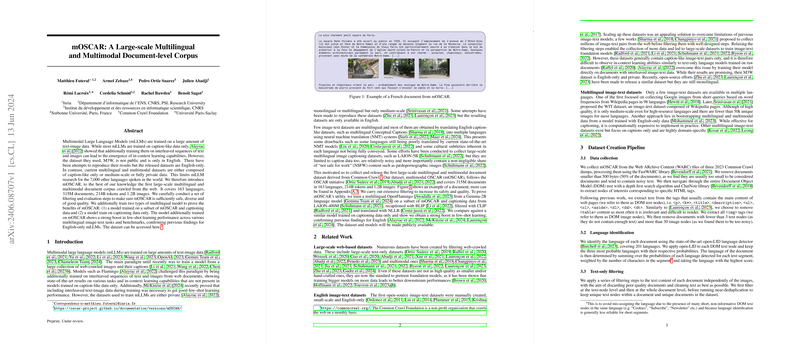mOSCAR: A Large-scale Multilingual and Multimodal Document-level Corpus: A Critical Review
The paper "mOSCAR: A Large-scale Multilingual and Multimodal Document-level Corpus" by Matthieu Futeral et al. introduces mOSCAR, an extensive multilingual and multimodal dataset. Unlike previous models which primarily relied on monolingual, caption-like data, mOSCAR acknowledges the importance of expanding the linguistic and cultural scope within the AI ecosystem.
Introduction to mOSCAR
mOSCAR is presented as the first large-scale dataset of its kind, encompassing 315 million documents, 214 billion tokens, and 1.2 billion images across 163 languages. The primary motivation behind mOSCAR is to overcome the limitations posed by existing datasets, which are often English-only and restricted to caption-like data. By providing a diversified corpus, mOSCAR aims to facilitate research and development in Multimodal LLMs (mLLMs) that cater to a broader linguistic spectrum.
Data Collection and Methodology
The data for mOSCAR is sourced from Common Crawl, processed through a rigorous pipeline involving multiple steps:
- Text and Image Extraction: Initial pruning removes ambiguities by filtering irrelevant and low-quality content.
- Language Identification: Implementing open-LID ensures the accurate classification of each document into one of 201 languages supported.
- Text and Image Filtering: Heuristics-based and model-based filtering ensure high-quality content. Key steps include eliminating NSFW content using models like nsfw-detector and NudeNet.
- Deduplication: Techniques like MinHashLSH are employed to maintain the uniqueness within and across documents.
- Combining Modalities: Joint text-image filtering is applied to ensure coherence between text and image data within documents.
Through these extensive stages, mOSCAR achieves a balance between data quality and diversity, making it a valuable resource for multilingual research.
Dataset Evaluation
Quality and Diversity Metrics:
- Text Content: Evaluated via perplexity (using Gemma-2B) to assess quality and Vendi score (SimCSE embeddings) for diversity.
- Image Content: Assessing image diversity using the Vendi Score, compared against datasets like LAION-400M demonstrated mOSCAR's superior text-image diversity.
Experimental Evaluation
To validate the utility of mOSCAR, the authors trained a multilingual OpenFlamingo model on a subset of mOSCAR combined with captioning data from LAION-400M. The model was evaluated on diverse benchmarks encompassing visual question answering (xGQA, MaXM), captioning (xFlickrCO, XM3600), reasoning (XVNLI, MaRVL), and cross-modal machine translation (Multi30K, CoMMuTE).
Results:
- The mOSCAR-enhanced model outperformed those trained on captioning data alone, particularly in few-shot learning scenarios.
- Significant boosts in multilingual few-shot performance were observed across tasks, highlighting the importance of document-level interleaved training data.
- Evaluation on translate-test benchmarks underscored the advantage of mOSCAR in translating textual content and performing zero-shot disambiguation.
Implications and Future Directions
Theoretical Implications:
- The inclusion of a wide range of languages ensures that models are more robust and capable of covering underrepresented populations.
- Document-level interleaved data offers a stronger basis for in-context learning, as demonstrated by superior performance metrics.
Practical Implications:
- mOSCAR sets a new standard for dataset creation, emphasizing both multilingual and multimodal data.
- This dataset opens new avenues for enhancing the linguistic inclusivity of AI models, crucial for applications in global contexts.
Future Developments:
- Moving forward, a critical area for expansion is the inclusion of more low-resource languages by further optimized web-crawling and data filtering techniques.
- Long-term research should also focus on diminishing the inherent biases and toxicity that may arise from web-crawled content, ensuring safer and more equitable AI development.
Conclusion
In summary, mOSCAR represents a pivotal advancement in the field of multilingual and multimodal datasets. By offering a comprehensive corpus that spans 163 languages and multiple modalities, it addresses significant gaps in the current landscape of mLLM research. The dataset not only enhances few-shot learning performance but also fosters broader inclusivity, making it an invaluable resource for the future of AI development.
